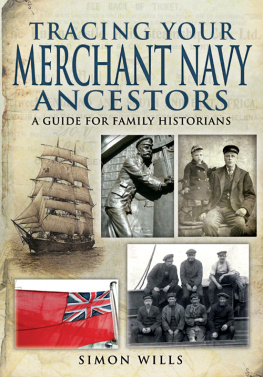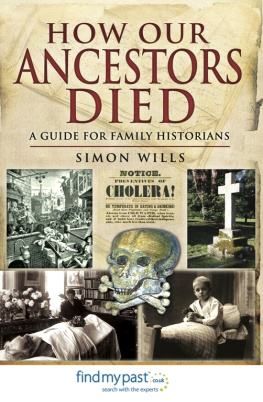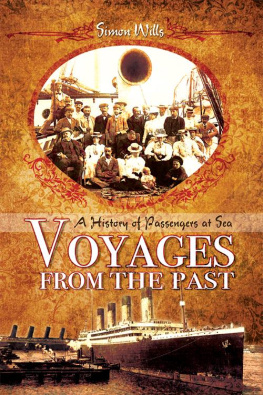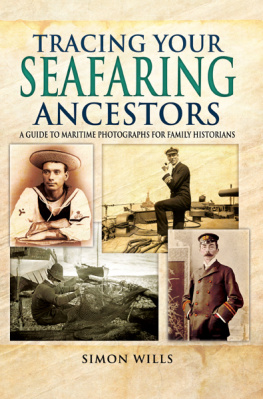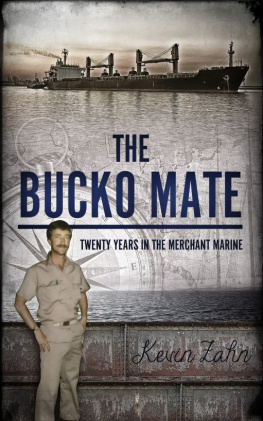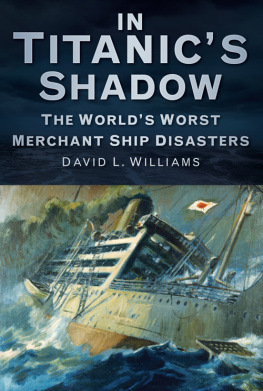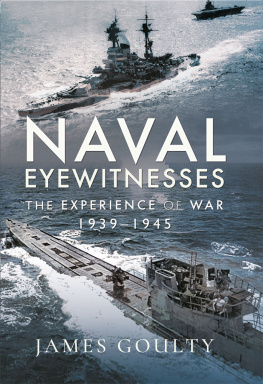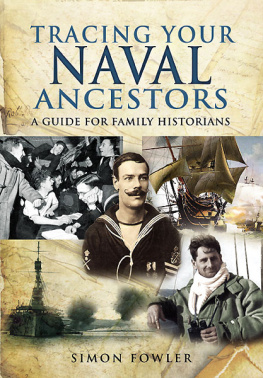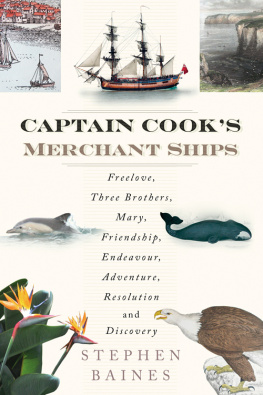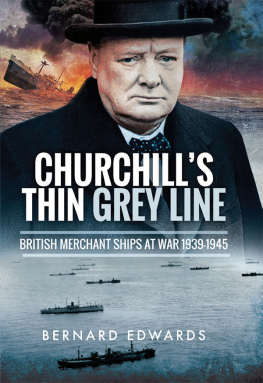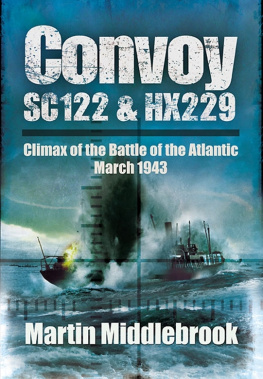
FAMILY HISTORY FROM PEN & SWORD
Birth, Marriage and Death Records
David Annal and Audrey Collins
Tracing Your Channel Islands Ancestors
Marie-Louise Backhurst
Tracing Your Yorkshire Ancestors
Rachel Bellerby
Tracing Your Royal Marine Ancestors
Richard Brooks and Matthew Little
Tracing Your Pauper Ancestors
Robert Burlison
Tracing Your Huguenot Ancestors
Kathy Chater
Tracing Your Labour Movement Ancestors
Mark Crail
Tracing Your Army Ancestors
Simon Fowler
A Guide to Military History on the Internet
Simon Fowler
Tracing Your Northern Ancestors
Keith Gregson
Your Irish Ancestors
Ian Maxwell
Tracing Your Scottish Ancestors
Ian Maxwell
Tracing Your London Ancestors
Jonathan Oates
Tracing Your Prisoner of War Ancestors:
The First World War
Sarah Paterson
Tracing Your Black Country Ancestors
Michael Pearson
Tracing Your Tank Ancestors
Janice Tait and David Fletcher
Tracing Your Air Force Ancestors
Phil Tomaselli
Tracing Your Secret Service Ancestors
Phil Tomaselli
Tracing Your Criminal Ancestors
Stephen Wade
Tracing Your Police Ancestors
Stephen Wade
Tracing Your Jewish Ancestors
Rosemary Wenzerul
Fishing and Fishermen
Martin Wilcox
Tracing Your Canal Ancestors
Sue Wilkes

First published in Great Britain in 2012 by
PEN & SWORD FAMILY HISTORY
an imprint of
Pen & Sword Books Ltd
47 Church Street
Barnsley
South Yorkshire
S70 2AS
Copyright Simon Wills 2012
ISBN 978 1 84884 6651 7
Digital Edition ISBN: 978 1 78346 1608
The right of Simon Wills to be identified as Author of this Work has been
asserted by him in accordance with the Copyright,
Designs and Patents Act 1988.
A CIP catalogue record for this book is
available from the British Library.
All rights reserved. No part of this book may be reproduced or transmitted in any form
or by any means, electronic or mechanical including photocopying, recording or by any
information storage and retrieval system, without permission from the Publisher in
writing.
Typeset in Palatino and Optima by
Phoenix Typesetting, Auldgirth, Dumfriesshire
Printed and bound in England by
CPI Group (UK) Ltd, Croydon, CR0 4YY
Pen & Sword Books Ltd incorporates the imprints of
Pen & Sword Aviation, Pen & Sword Family History, Pen & Sword Maritime,
Pen & Sword Military, Pen & Sword Discovery, Wharncliffe Local History,
Wharncliffe True Crime, Wharncliffe Transport, Pen & Sword Select,
Pen & Sword Military Classics, Leo Cooper, The Praetorian Press,
Remember When, Seaforth Publishing and Frontline Publishing
For a complete list of Pen & Sword titles please contact
PEN & SWORD BOOKS LIMITED
47 Church Street, Barnsley, South Yorkshire, S70 2AS, England
E-mail:
Website: www.pen-and-sword.co.uk
To Dad,
who taught me to love the sea
PREFACE
T he merchant navy has been vital to Britains prosperity, identity, and worldwide influence. Although the phrase merchant navy suggests that it is one large organisation, it has always consisted of many separate entities, ranging from an individual owning a single ship to large shipping companies with enormous fleets at their disposal. Whatever their size, merchant navy organisations are all focused on the means by which ships can yield a commercial profit from the sea.
Merchant ships initially employed only seamen, with officers such as captains to control them, but the growth of the industry, coupled with technological advancement, meant that new roles emerged in the nineteenth century. When sail gave way to ships with engines, engineers were needed. When large passenger ships began to ply the seas, staff were needed to cater for the publics needs while on board. So a career in the merchant service has not necessarily meant becoming a seaman or ships officer.
It is very common when researching a British family tree to find ancestors who went to sea because such huge numbers of people were employed in the merchant service. Once you find one seafarer, though, you may find many because it was a career that often ran in families: fathers took their sons to sea with them to teach them what they knew. A seagoing career was mainly confined to men until the twentieth century.
Compared to many other occupations, the delight for family historians researching merchant navy employees is that so much information has survived, especially after 1835. However, this apparent benefit may be a problem for the newcomer because, with so much information available, it can be difficult to know where to start. In this book, I have tried to be practical and focus the readers attention on the subjects that people most commonly want to investigate. For example, you may already know that your forebear was a captain, or have recently found that a relative was a seaman, so there are chapters devoted to these two topics to guide you through the sources available to take your research further. I have found that most family historians want to know more about the individual ships that their ancestors served on but it can be difficult to find advice about how to do this, consequently I was particularly keen to include a chapter about it. I have also always been intrigued by family tales that have survived down the generations, and yarns about shipwrecks and gallantry at sea are some of the most exciting, so there is a chapter that looks at this area. Finally, I have offered advice on how to explore the war service of merchant navy employees.
Where at all possible, I have guided you towards sources of information on the internet in the first instance. Good-quality web resources will often save you a great deal of time because they are usually indexed by name, and do not require you to travel in order to access information. However, you will probably need to visit The National Archives (TNA) in London at some point. Their holdings of merchant navy records are unrivalled, but do prepare carefully before you go by reading their online Research Guides. These can all be found on the TNA website, www.nationalarchives.gov.uk, and are indexed under Merchant Seamen and Merchant Shipping. However, this book introduces you to the many resources held by other organisations that can also help you take your researches further.
You will note that throughout the book I have tended to prefer the word captain to describe the man in charge of a ship because it is the word that most people know, but historically this figure was often referred to as the ships master.
The challenge of researching a merchant navy ancestor is essentially to understand what resources are available and then to adopt a methodical approach to hunting through them. In this respect, I hope this book will be your trusty guide and companion, and that you will enjoy using it as much as I have enjoyed writing it.
Chapter 1
BRITAINS MERCHANT FLEET
T he merchant navy consists of ships that ply the seas for commercial reasons. This includes passenger ships, cargo ships, support vessels (e.g. tugs), and fishing vessels. This book is not concerned with fishermen, who are considered in a companion publication: Martin Wilcoxs

